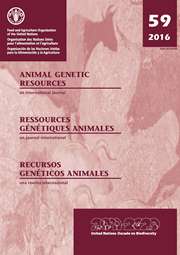No CrossRef data available.
Article contents
Establishing a National Focal Point for farm animal genetic resources in South Africa
Published online by Cambridge University Press: 01 August 2011
Summary
The recent call from FAO to take part in the process of preparing the First Report on the State of the World Animal Genetic Resources (SoW) stressed the need to develop management capacity at country level to facilitate the preparation of country reports (CRs). A key role is played by the National Focal Points (NFPs) and the National Coordinators (NCs).
A national workshop was held in South Africa in 1998 and a National Committee for Farm Animal Genetic Resources (FanGR) was established. The existing Indigenous Livestock Committee was reviewed and adapted to make it more focused on the management of FAnGR. At the same time a National Coordinator was also identified and the Animal Improvement Institute was nominated as national coordinating institute for FAnGR.
The collaboration with some NGOs was strongly suggested, particularly with:
a) the Farm Animal Conservation Trust (FACT), to assist with the conservation of farm animal genetic resources. This NGO was modelled on the Rare Breeds Survival Trust (RBST) in the United Kingdom and on Rare Breeds International (RBI)
b) The South African Stud Book and Livestock Improvement Association (SASB) and
c) many Rural Communities and National and Provincial animal genetic resource centres
The institutional frame for AnGR conservation in South Africa is briefly described, together with the aims of the South African conservation activities.
Résumé
Le récent appel lancé par la FAO pour prendre part au proces de préparation du Premier Rapport sur la Situation mondiale des ressources génétiques animales (SoW) a souligné la nécessité de développer les capacités de gestion au niveau national pour faciliter la préparation du rapport national (RN). Les Points focaux nationaux et les Coordinateurs nationaux jouent un rôle important dans proces.
Un atelier national a été tenu en Afrique du Sud en 1998 suit auquel un Comité national pour les ressources génétiques animales (FanGR) a été établi. Le Comité pour les races indigènes a été revu et adapté afin de l'orienter vers la gestion des FanGR. Au même moment, un Coordinateur national a été nomé et le Animal Imporvement Institute est devenu l'institut de coordination pour les FanGR.
On suggère vivement la collaboration avec certaines ONG, en particulier:
a) le Fonds pour la conservation des animaux d'élevages (FACT), pour aider à la conservation des ressources génétiques animales. Cette ONG s'est inspirée au Rare Breeds Survival Trust (RBST) au Royaume Uni et au Rare Breeds International (RBI).
b) Le South Africa Studbook et le Livestock Improvement Association (SASB).
c) Plusieurs centres de ressources génétiques animales au niveau des Communautés rurales, nationales et de province.
Le cadre institutionnel pour la conservation des Ressources génétiques animales (AnGR) en Afrique du Sud est présenté brièvement dans cette article ainsi que les objectifs pricipaux des activités de conservation en Afrique du Sud.
- Type
- Research Articles
- Information
- Animal Genetic Resources/Resources génétiques animales/Recursos genéticos animales , Volume 32 , April 2002 , pp. 19 - 25
- Copyright
- Copyright © Food and Agriculture Organization of the United Nations 2002


